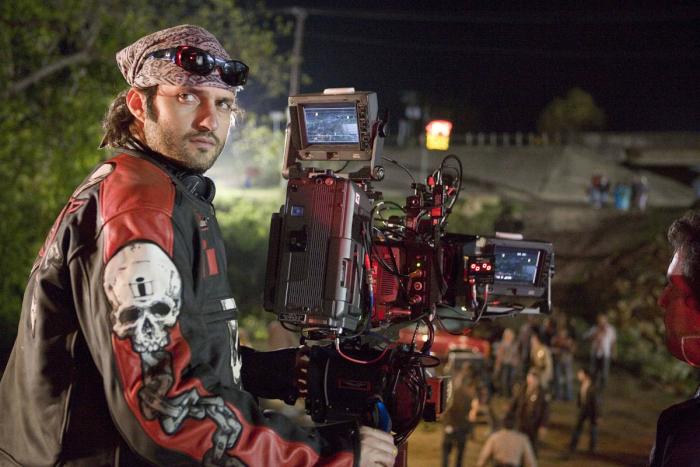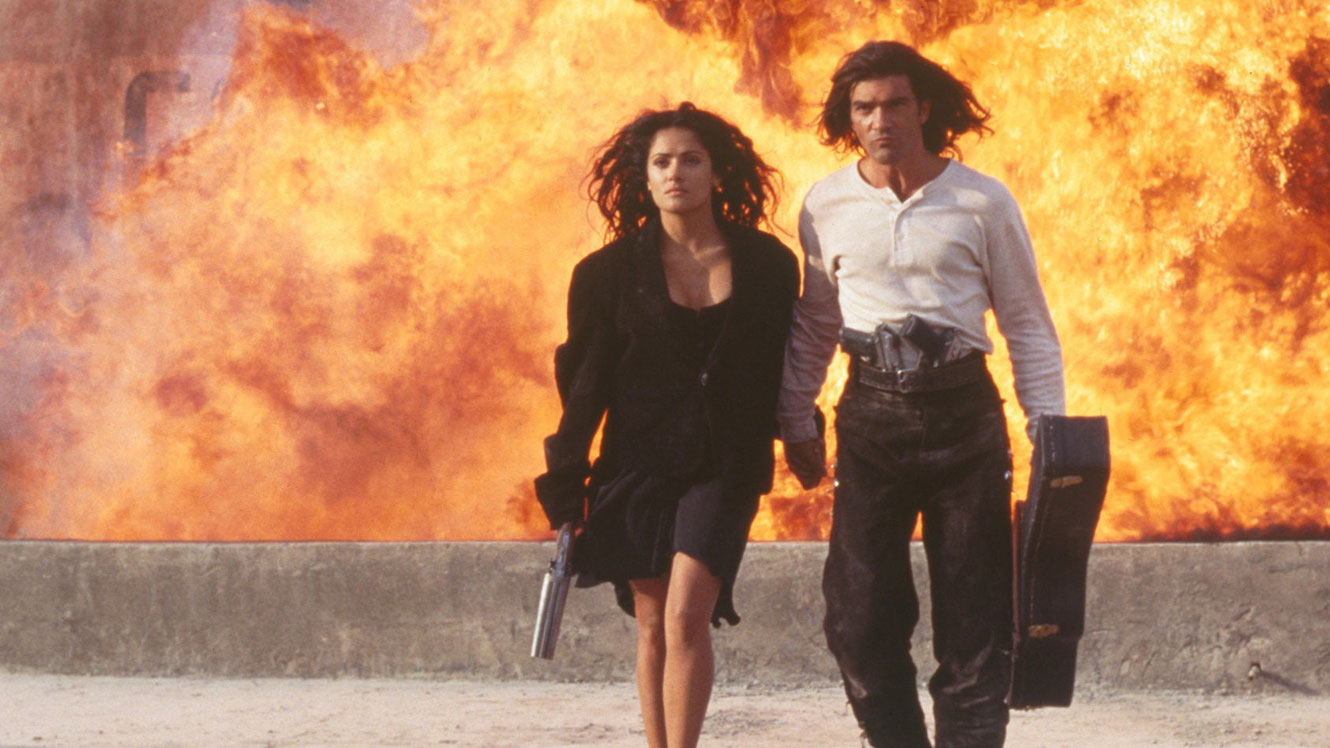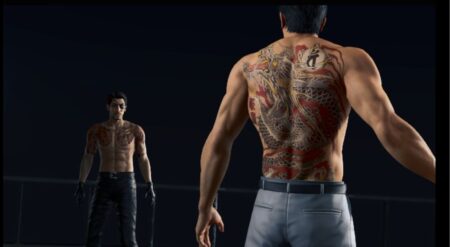
This article isn’t about Robert Rodriguez ‘s style of filmmaking or the man himself. It is, instead, about how he brings Latinx voices to the front of his stories, yes, even in a Spanish actor like Antonio Banderas. As the most well-known Mexican American director, Rodriguez has made a name for himself with violent movies that focus on shock, gore, and fit into the b-movie genre. They have gags galore, interesting kills, but they also have heart.
In 1992, Robert Rodriguez, the University of Texas grad, broke into the film world with El Mariachi (1992), a movie about a traveling mariachi mistaken for a murderous mariachi and his attempt of escaping and hiding from a gang out to kill him. He then released Desparado (1995), the second in the Mexico Trilogy (the third installment being Once Upon a Time in Mexico), casting Spanish actor Antonio Banderas, as El Mariachi out for revenge after the events in the first movie.
Aside from Banderas, Joaquim de Almeida, and Steve Buscemi, the cast list of Desperado shines with Latinx talent, and mostly Mexican/Chicano talent: Salma Hayek, Cheech Marin, Danny Trejo, Tito Larriva, and Carlos Gomez. Like his sometimes co-director Quentin Tarantino, Robert Rodriguez also tends to work with the same actors from movie to movie. With many from Depserado coming back for appearances and roles in other films – some reprising their role and other embodying a new character.
With 43 directing credits, the choice of Latinx talent shines as he brings them into bigger and better roles. In addition to the recurring cast of Salma Hayek and Danny Trejo, Robert Rodriguez has constantly reached out to rising stars and other Latinx talent like: Alexa Vega, Jessica Alba, Michelle Rodriguez and currently Rosa Salazar and Eiza Gonzalez. With all the names listed, it is clear that Rodriguez’s Chicano identity informs his stories and his casting choices who are predominantly Latinx/Chicano themselves.
For me, Robert Rodriguez is able to cast an almost entirely Latinx cast in his films because the stories he writes almost always focus on Mexico or Texas for which he uses his culture and background to inform his writing. When watching a Rodriguez film you know that Mexican is the default background of the character. I can’t say that every film he has made has had brown voices at the center, notably The Faculty (1998), Sin City (2005), and Sin City: A Dame to Kill For (2014) and the last 2 installments of the Spy Kids franchise, are not centered around Latinx talent.
However, because Mexican is the default in Robert Rodriguez movies for a lot of his characters, I genuinely thought Antonio Banderas was Latino, and specifically Mexican actor. For years I credited him as one of my favorite examples of Latinx representation in film. I was shocked when I found out that he was a Spanish actor who was just casted as Mexican characters in the States.
Today, we have more Latinx talent than ever and we rightfully push for Latinx actors to play Latinx characters. Because of this, I think, Banderas’ existence in the Rodriguez-verse is often glossed over, not usually critiqued within my circles, simply not talked about. While I wholeheartedly agree with the statement above (i.e. Puerto Ricans should play Puerto Rican characters, not darkened white actors — looking at you West Side Story), it’s important to understand what Robert Rodriguez did by making Banderas a leading man and how that impacted the landscape of film. For a talent with a Spanish accent to be shown in leading role, as a leading man, instead of in the background was big.

Although Antonio Banderas is Spanish, and not Latinx (this specifically refers to people with cultural backgrounds from Latin America), he is white-passing until he opens his mouth to speak. His accent is something he wears proudly and it is also a feature that marks him as other, especially in Hollywood, and something he had to actively work against. In the early 90s, there is little room for an accented actor playing a leading role or at least in a way that made them strong and a hero and not a comedic punchline — no shade to John Leguizamo. With Desperado, not only did Rodriguez choose 2 accented actors but created an action hero out of Banderas that fits into the landscape of action films at the time. He also solidified Banderas as a leading man in Hollywood.
Without this, even with his success in Spain, it’s hard to imagine Banderas landing roles that were outside the “latin lover.” Although coding a character as Latinx instead of hiring Latinx talent is something that we have moved passed, at that point in Hollywood, seeing an action hero speaking with a heavy accent that wasn’t exaggerated or faked, but real, was what we needed to get on the screen. Beyond that, he and Salma opened a door for us and Rodriguez has since banked on Latinx talent and brought them to the front of stories in new and different ways.

One of the critiques of Robert Rodriguez is how he often leads into stereotypes and ulta-violent style. Although he pulls hard on stereotypes his status as a Chicano filmmaker informs them as well and he is ultimately careful not to cast his recurring characters as only one-dimensional and works at fleshing them out.
In fact, he’s built an entire world around a tattooed assassin from Desperado: Machete (say it with me, Mah-che-teh). Played by Danny Trejo, Machete in the Rodriguez-verse serves as the perfect example of taking unknown talent and making him known, and in Trejo’s case, a pop culture icon. Prior to meeting Rodriguez, Trejo was in movies as the gang member, a criminal, and a Chicano stereotype.
Although the role of Machete is rife with stereotypes surrounding Mexican migrant workers, he’s also a character who was allowed to show his comedic and tender side in Spy Kids (2001) as Uncle Machete. Allowing Trejo to be both a villain, a hero, and a loving uncle, Rodriguez mad Trejo into a certified star. Now, Trejo is a moment in pop culture. He’s in commercials, in action movies, and his tattooed chest is know by many even if only by his character’s name.
Elevating Latinx talent and casting diverse films, specifically casting Mexican and Chicano actors, has been his thing since the start and he has never lost sight of it. With the creation of the El Rey Network in 2013, a venture with Univision, he opened the door for representation in front of and behind the camera.
Not only does it produce diverse Latin content, it produces it as an Enligh-language channel. It is speaking to the Latinx in the int U.S. who are not fluent in Spanish as well as speaking to a wider non-Latin audience.
Representation has been at the core of what he’s always done:
“With Desperado, I found that I had to just make my own stars because there wasn’t Latin actors who were given jobs or you could cast or that people would find bankable. You had to give them opportunities, bringing Antonio from Spain, bring Salma Hayek, and give Danny Trejo every movie possible so he could become a star, so that you would have a star system. And when I had the idea for this network it was a continuation of that, only now we could do shows and we can train people behind the camera as well as in front of it – especially behind the camera because that’s really where you move the needle. They can go write, and direct, and produce feature or television shows that are very authentic in the story-telling and that are true to themselves.”
In fact, according to Rodriguez, the El Rey Network and it’s diverse casts, writers, and directors leads the network to have 60-70% Latinx representation. With programming focused on cult classics and original series most notable From Dusk Til Dawn (the tv series based on his 90s movie) and the wrestling program Lucha Underground – which saw the return of Chavo Guerrero, of the Chicano pro-wrestling Guerrero family. For him, representation was the goal, the creation of new talent was the goal, and empowering other Latinx creators is still the goal.
Rodriguez isn’t without his problems/faults/controversies: hyper-sexualized Latinas are often the only representation brown women have in his films (granted they tend to kick more ass than the men), the ultra-violent style leaves it in the cult scene and often at odds with critics, but most recently the allegation that he exploited Rose McGowan during the filming of Planet Terror (2005).

Ultimately, the work Robert Rodriguez has done to further Latinx talent in all aspects of content creation is something to applaud and the importance of the creation of the El Rey Network can’t be overstated. I also feel that Rodriguez’s style of making his leads Latinx in genre film is a huge statement. When most directors of color are only recognized when making films that tell the pain of their community in a historical film, he has stuck with genre and grind-house.
Rodriguez has done a lot for the Latinx community in Hollywood and continues to do so with Alita: Battle Angel coming out in 2019. He is using this manga adaptation of a dystopian cyberpunk work to highlight Latina talent with Rosa Salazar in the titular role and Eiza Gonzalez and Michelle Rodriguez having roles as well.
As of 2016, Latinx communities in the US make up 17.8% of the population, the largest of any minority community. Latinx moviegoers also buy the most tickets from any other minority community by a significant margin. But when it comes to media representation, speaking roles for Latinx talent sit at 5.8% of all roles.
We have yet to have a Latina win for Best Actress at the Oscars and we have yet to see U.S.-born Latinx talent shine in award categories as a whole. As I remember the importance of Robert Rodriguez for representation in film, I’m left wondering: Where are the other directors like him? and how long will we have to wait to see our faces on screen regularly? 2018 stands to be a great year for Latinx talent in film, lets hope they do well.






